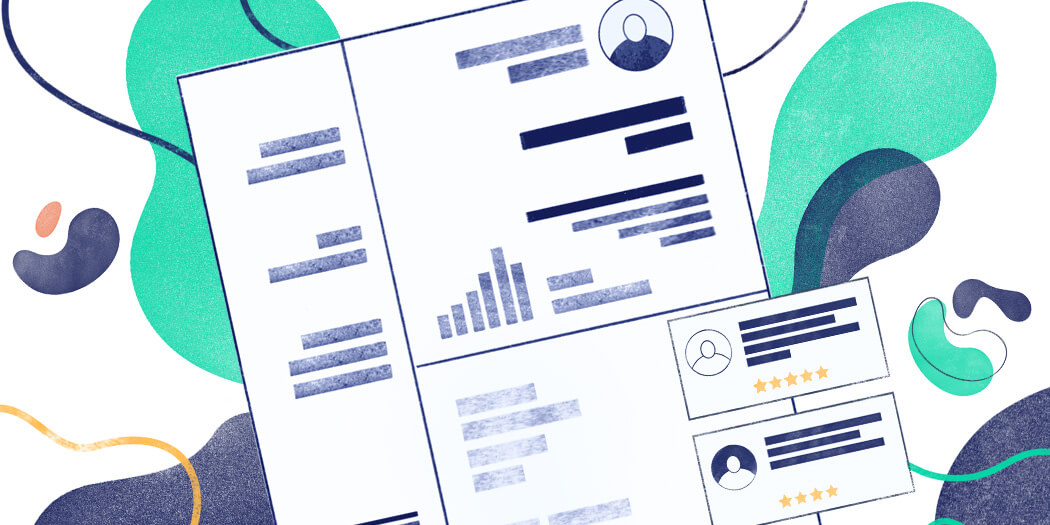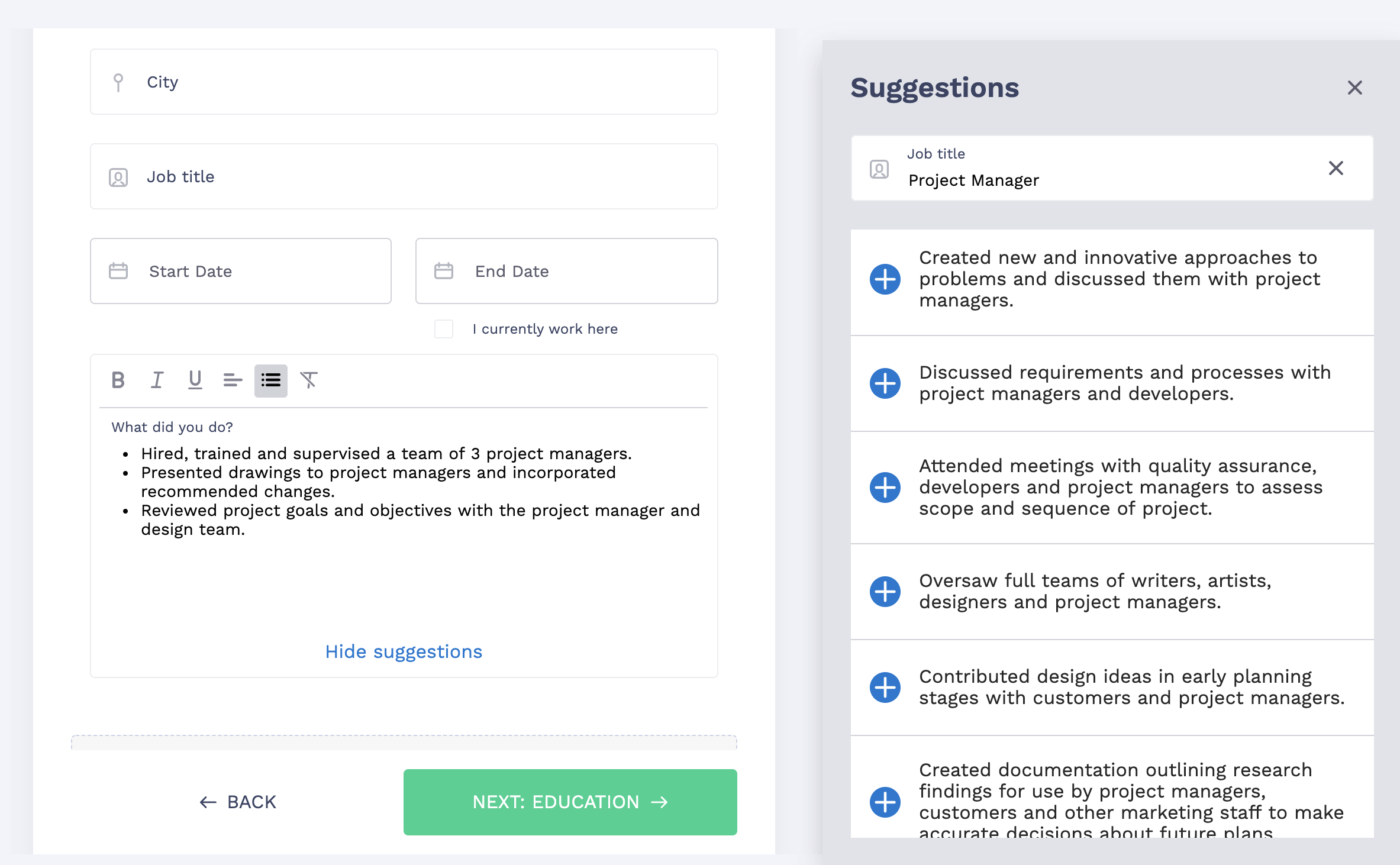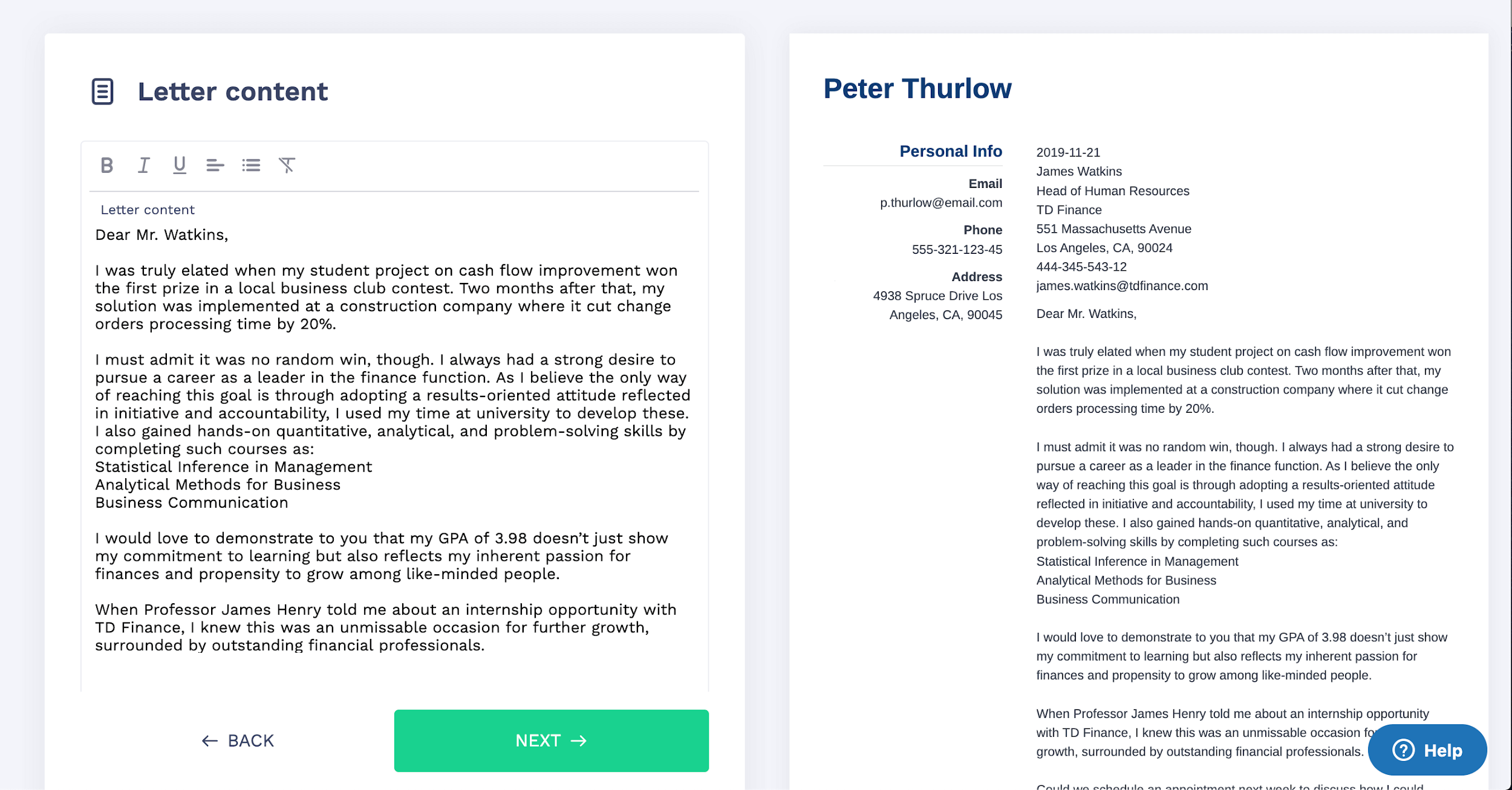Choosing a career path is scary—
It feels like you’ve turned on to a one-way highway—
No exit in sight. You’re trapped. And there’s no turning back.
The good news?
You’re about to learn how to thrive in your career as a person with a disability. And lucky for you—there are tons of resources available to you.
Let’s see how you can move your career forward.
Create my resume now

Create a job-winning resume with little effort. Hack your way through ATS software with our 18 beautiful templates—give our builder a try!
1. Learn Your Rights as a Worker with Disabilities
Let’s stay positive—it’s not all gloom and doom.
In fact, unemployment for workers with disabilities fell to 8 percent last year—an all time low.
So jobs are out there.
But—
Choosing the right career path is a different matter altogether.
The first step?
Learning the rights you have as an individual with disabilities.
You might feel helpless sometimes, but don’t forget you are protected.
Under the Americans with Disabilities Act, all people with disabilities are protected in the workplace.
Whether you’re a job seeker or an employee, companies are obligated to provide you with reasonable adjustments.
What would this look like?
Materials printed in larger fonts. Sign language interpreters. Documents translated into Braille or on audiotape. Don’t lose hope in the process of applying because you believe no one will adjust the workplace to your needs.
Companies are required by law to modify the workplace for them.
In fact, affirmative action is required in hiring, placing, and advancing people with disabilities in the workplace. The Rehabilitation Act makes it illegal for companies to discriminate on the basis of your disability.
Need more knowledge and advice on what your rights are? Check out a few of these resources:
Opportunities are out there.
Here’s a perfect place to start.
2. Use Job Placement Programs for People with Disabilities
Your rights as a person with disabilities aren’t just a set of words.
There is action set in place to help you. Work programs are a great way to help people with disabilities find their dream jobs.
They’re not only free—they are run by professionals who understand what you’re going through. They’ll listen and place you in the best working environment to help you thrive.
Here are a few options to get you started:
- Ticket to Work program—connects you with free employment services to see if working is right for you. Prepares you for work, helps you find a job and maintain success while you’re working.
The upside? You receive free career counseling, vocational rehabilitation, and job placement from employment networks or State Vocational Rehabilitation agencies. It’s the perfect start if you’re a person with a disability and age 18-64.
- AbilityOne.gov—provides employment opportunities for those who have significant disabilities. The program targets two groups: people who are blind or those who face the highest barriers for being competitive on the job market alone.
- USA Jobs, Individuals with Disabilities Program—want to work in the Federal Government? This program helps different government agencies find workers with disabilities through hiring authorities. Choose this option if you require more reasonable adjustments than employers would generally make for you.
Plus, federal workers get the best benefit packages on the job market and make 17 percent more than private sector employees on average. Enroll in this program and you’ll work directly with a Selective Placement Program Coordinator who guides you through the application process.
Don’t want to enroll in a program but want to search for jobs on your own? Check out these online job search websites made for people with disabilities who employers are searching for:
3. Decide What Career Works Well With Your Needs
So—you’re ready to get out there.
You have all the resources you need to help you enter the workforce as a person with disabilities.
But then—reality sinks in.
What career path do I want?
Don’t feel your options are limited because of your disability.
You might be limited in your job functions, but there are paths out there for you to take.
Whether you have autism, speech impediment, intellectual/mental health disabilities or physical disabilities, your dream career is awaiting you.
Still—you are the one to best assess what careers you flourish in.
Here are a few ideas to get your mind churning:
- Creative or artistic—musician, sculptor, photographer, filmmaker, graphic designer
- Technical—web developer, computer programmer
- Communication skills—technical writer, travel agent, advertising
- Solid judgment—fire inspector, personal financial advisor, school career counselor, judge, forensic science technician
- Research or analytical—computer research scientist, market research analyst, curator, medical science researcher, sociologist, cartographer
You can also take a personality test such as Myers-Briggs Type Indicator or The MAPP Career Test to see which work environment you would succeed in.
But—
Make sure you take these tests with a trained professional. They are the ones who are able to interpret the scores properly. Plus, they’ll connect your personality type with different work environments best suited for you.
Why is work environment so important for someone with a disability?
It’s not only about the physical requirements you need—it’s also about how you feel mentally. It's harder when you have to cater to your disability.
Try to find a career where you are able to work at home, are self-employed, or own a small business.
You'll have a flexible work schedule and can follow your own business plan. You'll also avoid transportation barriers and lenghty commutes.
Need help forming your small business? Check your local VR office to become self-employed or to start your own business.
If you don’t want to stay at home but be part of a larger team, many companies top the list when it comes to adjusting the workplace for those with disabilities.
Check out the career pages of the top six companies that hire people with disabilities: IBM, EY, Aetna, Cisco, Eli Lilly and Company, Merck and Co.
The ResumeLab builder is more than looks. Get specific content to boost your chances of getting the job. Add job descriptions, bullet points, and skills. Easy. Improve your resume in our resume builder now.
CREATE YOUR RESUME NOW

Nail it all with a splash of color, choose a clean font, and highlight your skills in just a few clicks. You're the perfect candidate, and we'll prove it. Use our resume creator now.
4. Enroll in an Education Program for People with Disabilities
So—you found a job placement program for people with disabilities. The people are great. They want to help you succeed in your career.
The problem?
You don’t like the options available to you.
What’s limiting you?
Your educational level or qualifications.
Try this—enroll in an education program tailored for people with disabilities. You’ll then have many more opportunities available to you after you complete the course.
Whether it’s getting a high school diploma or learning specific skills, these programs are the best option available to you.
Trust the numbers—the unemployment rate is 40 percent lower for workers with disabilities with a high school diploma.
What’s better, many of these programs are free for those who have disabilities and want to enter the workforce.
A good place to start is your state department of education or your local school boards. They connect individuals to nearby programs to answer any questions you have about state educational laws for people with disabilities.
You’ll have the best resources available to you through these educational boards.
Maybe you have a GED or this program isn’t the best option for you. You have a clear idea of what job you want to have but need help meeting all the certifications.
What to do?
Attend a vocational rehabilitation program. There are Departments of Vocational Rehabilitation who provide services to individuals with disabilities in every state.
Trade school programs offer great value to those who want to gain training to lead to gainful employment in a high-demand career. You’ll work directly with your local vocational rehabilitation center to pursue a career path most fitting for you.
Better yet, attend a vocational school geared specifically towards gaining valuable, job-oriented skills. Check these out:
Why is a vocational school good for those with a disability?
Some job functions won’t be affected by your disability.
Depending on what type of disability you have, some job tasks are suited perfectly for you. These are what people in the HR call splinter skills or functions working well with your disability.
For specific job training, check out some of these resource pages who help people with disabilities make an easy transition into the workforce:
- American Job Center—local American Job Centers are nationwide and offer an array of education and training programs to earn a certificate in a profession you’re interested in.
- Registered Apprenticeships—learn from a mentor with this on-the-job-training program for all different professions.
Choose the right vocational program with the help of a vocational rehabilitation professional, and you’ll be one step closer to advancing in your career.
5. Take Advantage of Your Network As A Student With a Disability
If you’re worried the great support network you had during your college days won’t be there after you graduate—
Don’t be. There are many resources available to you as a college graduate with disabilities.
Don’t underestimate what you’ve accomplished so far. 64 million people in the U.S. have disabilities, but only 7 percent have a college degree.
All your hard work is going to pay off.
Your part of the lucky minority who is doing well in today’s job market. The unemployment rate for workers with disabilities who hold a Bachelor’s Degree dropped to 6.8 percent in 2021.
Let’s see where to turn if you need a helping hand as a student or current graduate.
Start by talking to your guidance or career counselor at your high school, trade school, or college. They are the ones who know you best and know what jobs suit your needs.
Whether it’s job training, internships, or helping with your job search online, these disability student services coordinators are there to help you in this transition.
Want to venture out on your own? Other resources are available to you:
- Workforce Recruitment Program—connects college students and recent graduates with disabilities with federal and private sector employees to prove their abilities in the workplace.
- The Pathways Program—offers jobs and federal internships for students who have a disability. Students of all grade levels are eligible to apply—from high school to Master or Ph.D. students.
- American Association of People With Disabilities (AAPD)—this internship program gives students a mentor and hands-on work experience to help them succeed in their career.
Just remember—you’re not alone in your job search after you leave the school hallways. It might seem scary but there are plenty of resources, advocacy groups, and people who want to help you thrive in your career.
6. Polish Your Application Documents
Let’s recap what we’ve learned:
- You know your rights as a worker with a disability
- You know about work-placement programs
- You know what career change you want to make
- You gained more education and qualifications
Now—
It’s time to execute. You want to make a sharp left onto a different career path.
You’ll need the right tools—a perfect resume.
And trust me, you’re in the fast lane now—
You have 7 seconds to get the recruiter’s attention with your resume.
Here’s how to do it:
You’re changing gears like a pro—with this resume and a killer cover letter, it’s a combo to supercharge your professional life. Knowing how to write a cover letter for a job is greatly beneficial. So don't forget to do so.
Don't forget—you don't need to put your disability on your resume or cover letter. When you choose to disclose your disability is up to you.
Let's dive more into this—and other problems you may face in the workplace.
7. Develop Your Job Skills While Protecting Your Rights
It took some time, but you’ve made it—
Congratulations! You landed a great job. Your career is starting to take off.
But you’re realizing it’s just as hard to keep a job as it is to land a job.
Fear not—here are some tips to develop your career while balancing the needs of your disability.
Decide whether to disclose a disability and how much of your disability you share with an HR specialist at your workplace.
If you’re enrolled through a program, then it’s likely the HR staff knows you have a disability and will take your adjustments into account.
However, if you have a disability and do not require adjustments, then you are not required to tell an employer about your disability. This is entirely your choice.
If you do request modifications from your potential employer, here are a few things to consider:
- Timing of disclosure—visible disabilities may limit when you decide to disclose your disability. Think about whether taking charge and telling the HR specialist during your interview is the best route. It allows you to steer the conversation and enlighten them about your disability. Proactive approach is good for transparency.
- Place of disclosure—share your disability with only those necessary. Move the discussion to a private office and full confidentiality.
- Degree of information shared with others—be open and direct about your disability and explain what adjustments you need. Be professional about this information.
Part of disclosing a disability is about asking for reasonable modifications for your disability. Think clearly about what adjustments you would need given your disability.
A physical disability may require Braille or audiotapes for instance. A mental health disability requires more frequent, shorter breaks.
Part of your adjustment request is to require the employer clear guidelines on what your day-to-day activities are and not be stretched beyond your limits. Make sure to assert your rights as a person with disabilities if you feel they are not living up to this contract.
There will be times when you feel discriminated against. Here are the steps to take to protect yourself from such discrimination:
- File an internal complaint—bring this complaint to the HR manager of your company. It gives the company time to rectify the problem and solve the issue without further legal action.
- File a charge of discrimination—if the employer does not take seriously your complaint, you have the option to file a charge of discrimination with the Equal Employment Opportunity Commision. This must come first before you hire any lawyer. Please note you are required to file the charge within 300 days of the action occurring.
- Wait for the EEOC to process the claim—in most cases, the agency mediates or settles the case before further legal action is taken. The agency will offer a right to sue letter in all cases.
- File a lawsuit—if you plan on filing a lawsuit despite the EEOC’s decision, then hire a lawyer to represent your case.
Double your impact with a matching resume and cover letter combo. Use our cover letter creator and make your application documents pop out.
CREATE YOUR COVER LETTER NOW

Want to try a different look? There’s 18 more. A single click will give your document a total makeover. Pick a cover letter template here.
Key Points
It doesn’t have to be difficult to have a career with a disability. Take these steps and you’ll be on the right track:
- Start by exploring what career path works well for your disability. Take a look at all the different career paths available to you.
- Learn what your rights are as someone in the workforce with a disability.
- Make an action plan. Enlist in a job placement program to see what your job options are.
- Get the proper qualifications. If you want to complete your GED or gain valuable job qualifications, enroll in an education program for those with disabilities.
- Are you a student who has a disability and want to enter the workforce? Check out the different programs available to you at your university or local state educational board.
- Polish your application documents to land the job you want.
- Develop your job skills but protect your rights as a worker with a disability. Know what legal actions you need to take when you are discriminated against.
You’re ready to hit the ground running! Good luck and remember—
There’s always a helping hand around the corner.
Do you have any questions? Would you like to share your advice on how to choose a career? We’d love to hear from you. Give us a shout out in the comments below.


![How To Thrive In Your Career If You Have a Disability [Tips]](https://cdn-images.resumelab.com/pages/jobs_for_workers_with_disabilities_hero.jpg)




![Entry Level Resume Examples & Template for 2026 [+Tips]](https://cdn-images.resumelab.com/pages/entry_level_listing.jpg)


